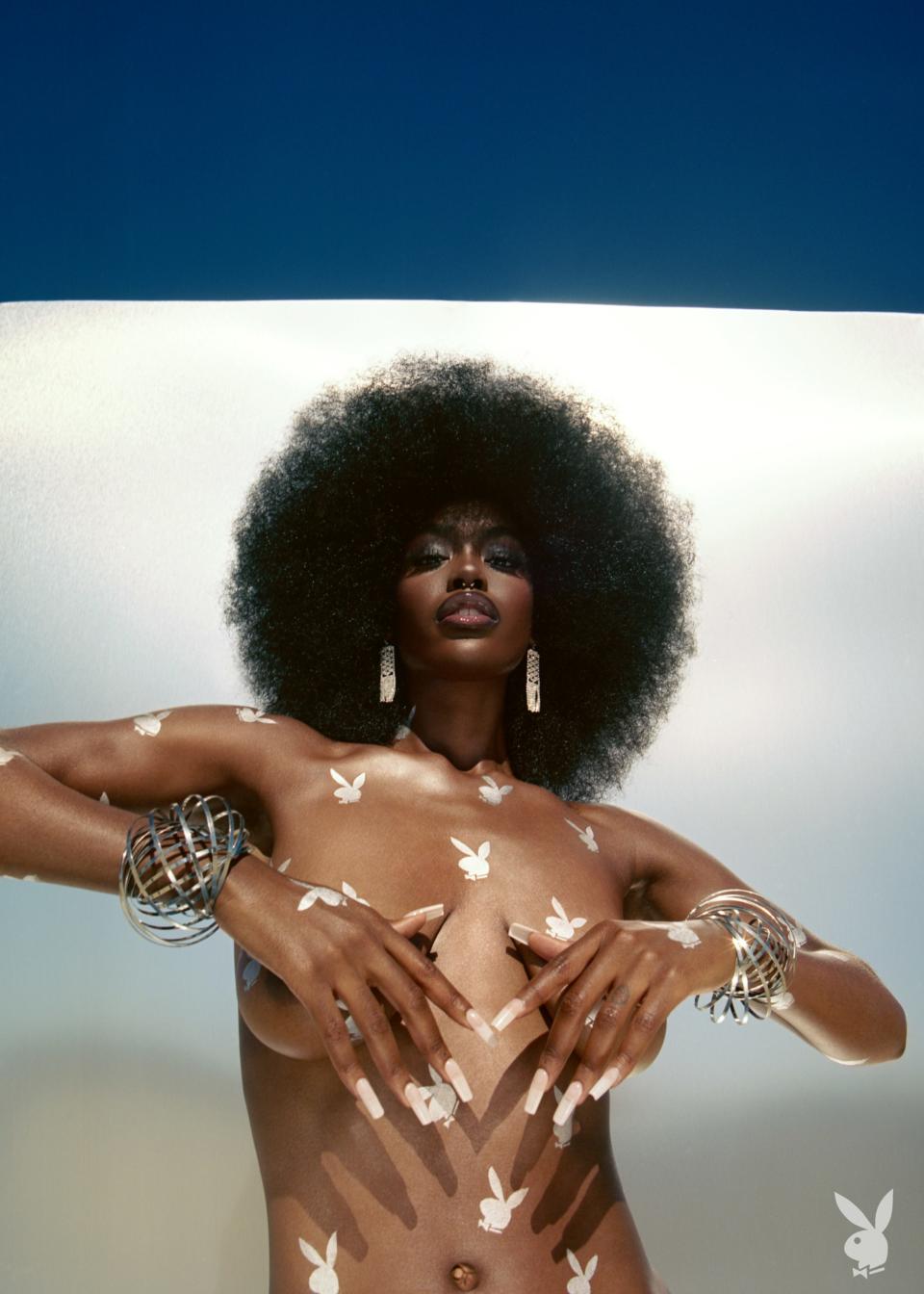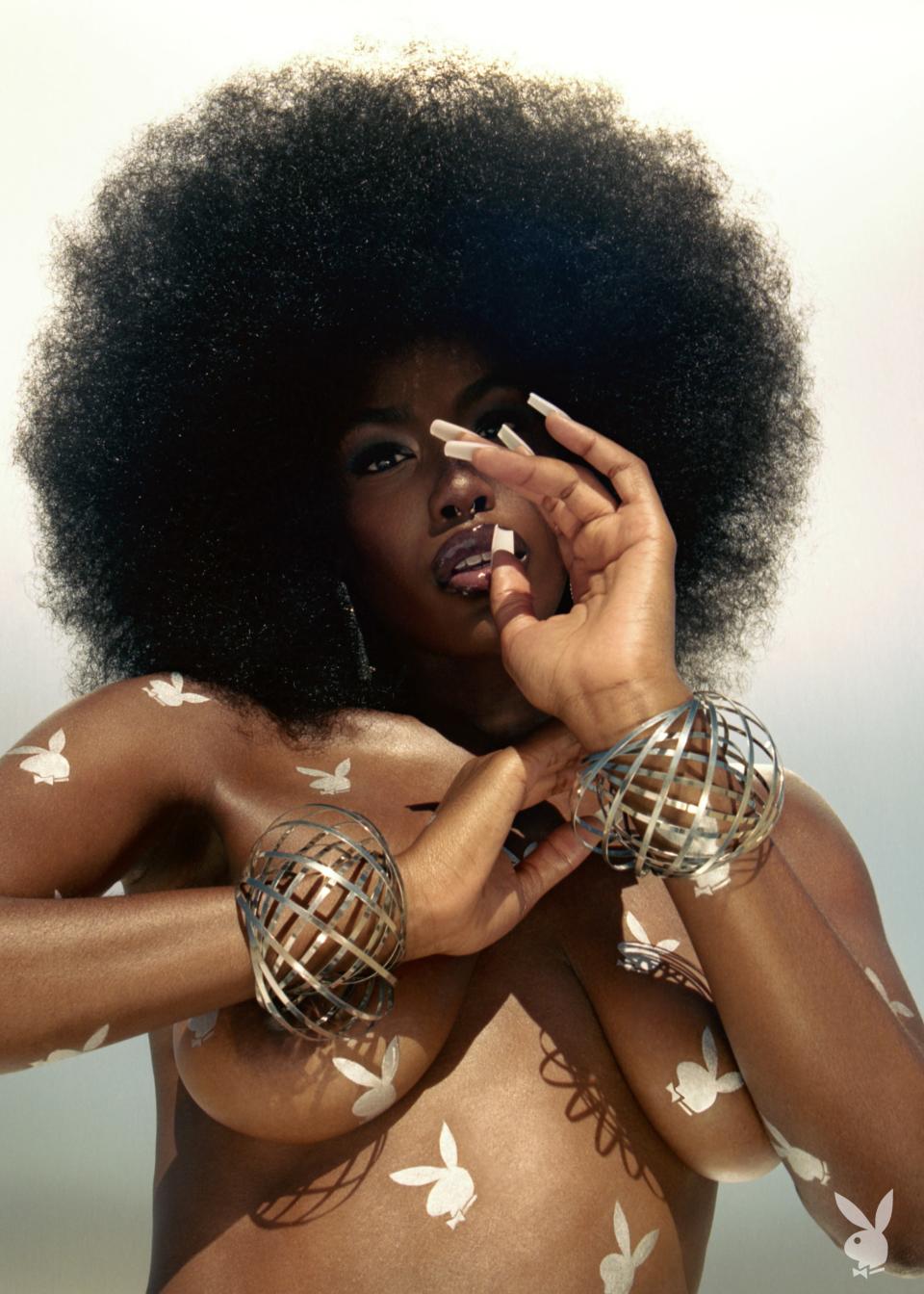Tanerélle Was Bullied for Her ‘Saggy Breasts.’ Now She’s a Playboy Playmate
Women are no strangers to being scrutinized for the way we dress, speak, and act. But for women of color—especially Black women—this scrutiny is often intensified. We’re used to being censored or doubted in the workplace, or having our hair policed. But ethereal singer Tanerélle, who was bullied last year for her “saggy breasts,” is refusing to be anything but her full self.
As Playboy's newest Playmate, she's opening the door for pertinent conversations about our culture’s beauty standards. The milestone is important—not just for Tanerélle but for all Black women. In 70 years and hundreds of women, Tanerélle is Playboy's 40th Black Playmate. That number should be higher, but seeing the artist—a dark-skinned Black woman with breasts that are, frankly, realistic—in a magazine that’s known for its promotion of unattainable American beauty standards is immense.
“Being able to express myself within spaces like these is always an honor because it’s not really about me, but all of us,” she tells Glamour. “Someone does it first, second, third, fortieth, and it’s all to continue to open doors for others.”
Tanerélle's story is familiar to many Black women: Last year she found herself the subject of online vitriol for a dress she wore, braless, to the BET Awards. Armchair critics picked apart Tanerélle's outfit and her “saggy breasts,” with some on Twitter asking whether she forgot to put on a bra or quipping she should have used boob tape for a lift. “I learned a lot about my commitment to self-love that night,” the singer says. “And my commitment to the fight for women and our bodies in general.”
What particularly hurt was that so many critiques came from women. “It pointed out how much we need more voices and leaders to speak up and out for us,” Tanerélle says. For her, the experience revealed how many people, including women, uphold unrealistic and harmful beauty standards. So Tanerélle clapped back at the trolls, writing, “I'm a woman and my natural tits hang and I fucking love it and I have no intention of changing it to suit your gaze."
In doing so, she became a welcome and needed symbol of self-appreciation for other women who saw themselves in her. As a Black woman dealing with my own body-image issues, I know I did.
It turns out the hate was a blessing in disguise, she says. “It placed me in a position to show others they’re not alone, and it presented another opportunity to show love to myself.”
That opportunity: Playboy. While Black women—or any women—obviously don't need the approval of a magazine to feel beautiful, we can't pretend representation isn't important. “We deserve to be in whatever spaces we see fit,” Tanerélle explains. “Not being portrayed in a society we peacefully live and participate in is equivalent to not having our existence acknowledged or respected.”


That extends to life outside Playboy, of course. Tanerélle is relentless about expressing herself however she chooses. Her cerebral, genre-defying music refuses to be boxed in, much like the singer herself. Her most recent work is “Star,” a bouncy mood track about pushing through dark times that she worked on with A$AP Ferg and Machinedrum. The song aligns with her own journey this year, navigating the pandemic and the onslaught of police brutality and protests. “I was going through a really low time and truthfully didn’t think I had it in me to even write a song,” she says. “‘Star’ is actually the only full song I’ve written this year.”
She also recently spoke out about the censorship of women’s bodies after Instagram took down her Playboy cover. “A moment of celebration, a moment of love, sexualized and condemned,” she wrote in her post. “I have no words right now. The policing of women’s bodies is infuriating.”
But her followers and fans got it exactly right in their comments. “The photo impacted us all and cannot be undone!” one user wrote. Another commented, “They’ll never erase your power.”
Indeed, Tanerélle and her fight for Black women’s bodies is powerful. And for other Black women who see ourselves in Tanerélle, that can never be censored, policed, or erased.
Arielle Gray is a multimedia journalist based in Boston.
Originally Appeared on Glamour

